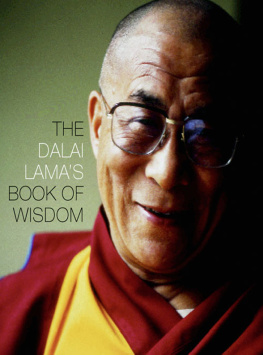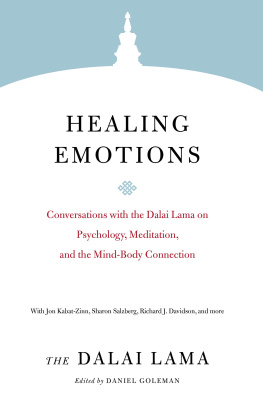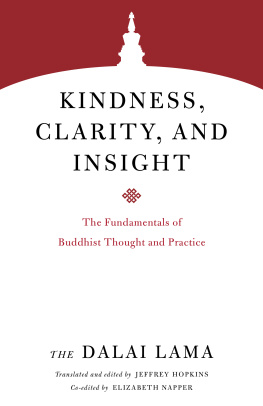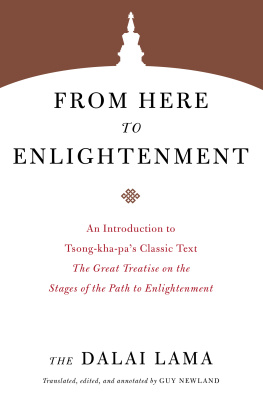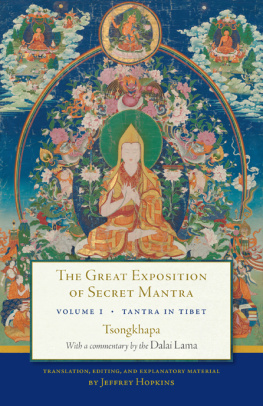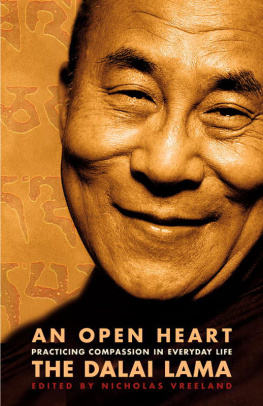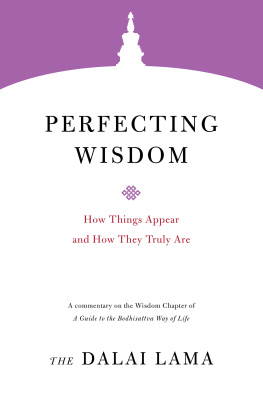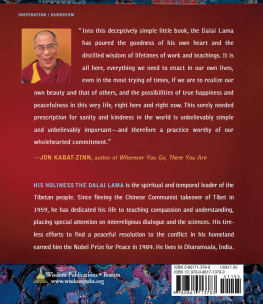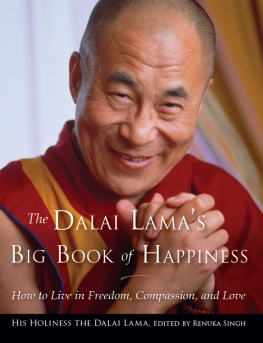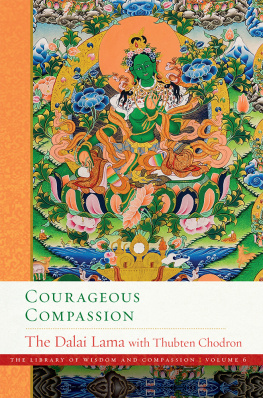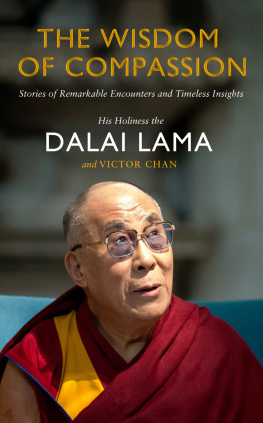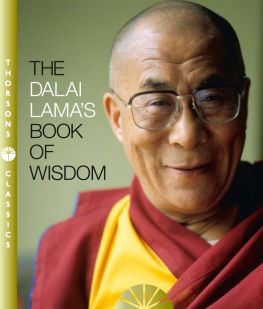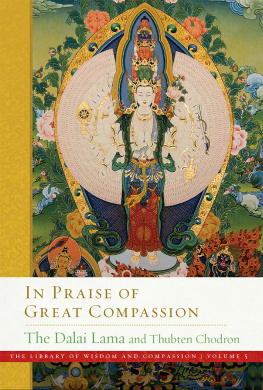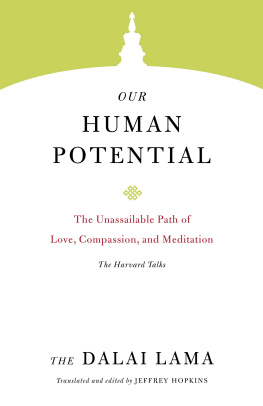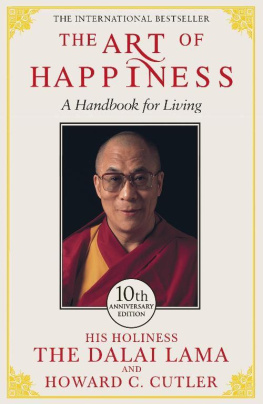The Dalai Lama - The Dalai Lamas Book of Wisdom
Here you can read online The Dalai Lama - The Dalai Lamas Book of Wisdom full text of the book (entire story) in english for free. Download pdf and epub, get meaning, cover and reviews about this ebook. year: 2000, publisher: Harpercollins, genre: Religion. Description of the work, (preface) as well as reviews are available. Best literature library LitArk.com created for fans of good reading and offers a wide selection of genres:
Romance novel
Science fiction
Adventure
Detective
Science
History
Home and family
Prose
Art
Politics
Computer
Non-fiction
Religion
Business
Children
Humor
Choose a favorite category and find really read worthwhile books. Enjoy immersion in the world of imagination, feel the emotions of the characters or learn something new for yourself, make an fascinating discovery.
- Book:The Dalai Lamas Book of Wisdom
- Author:
- Publisher:Harpercollins
- Genre:
- Year:2000
- Rating:4 / 5
- Favourites:Add to favourites
- Your mark:
- 80
- 1
- 2
- 3
- 4
- 5
The Dalai Lamas Book of Wisdom: summary, description and annotation
We offer to read an annotation, description, summary or preface (depends on what the author of the book "The Dalai Lamas Book of Wisdom" wrote himself). If you haven't found the necessary information about the book — write in the comments, we will try to find it.
The Dalai Lamas Book of Wisdom — read online for free the complete book (whole text) full work
Below is the text of the book, divided by pages. System saving the place of the last page read, allows you to conveniently read the book "The Dalai Lamas Book of Wisdom" online for free, without having to search again every time where you left off. Put a bookmark, and you can go to the page where you finished reading at any time.
Font size:
Interval:
Bookmark:
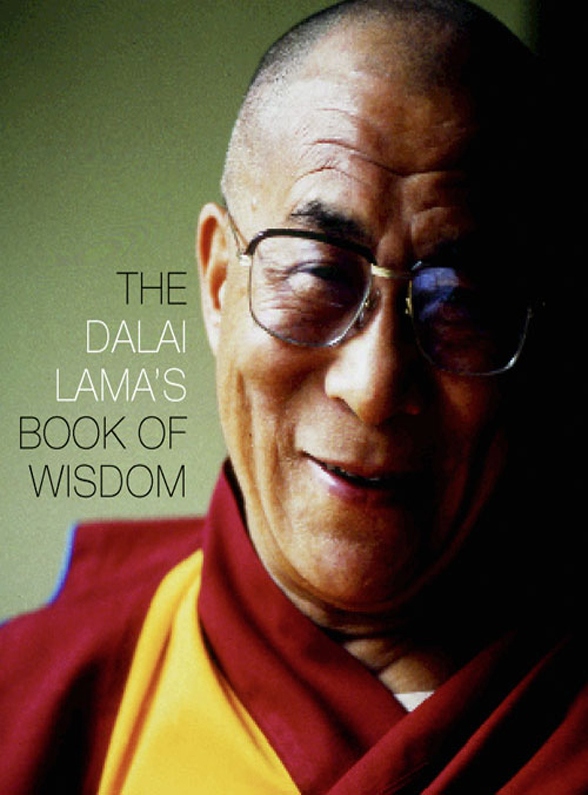
DALAI LAMAS
Book of
WISDOM

PART ONE:
CONTENTMENT, JOY AND LIVING WELL
PART TWO:
FACING DEATH AND DYING
PART THREE:
DEALING WITH ANGER AND EMOTION
PART FOUR:
GIVING AND RECEIVING
The Book of Wisdom is an extract from the earlier publication of Power of Compassion teachings by His Holiness the Dalai Lama given in May 1993 in London.
It is hoped that this extract The Book of Wisdom will bring His Holiness the Dalai Lamas message about the importance of love, compassion and forgiveness to a wider audience.
His Holiness the Dalai Lama is the spiritual and temporal leader of the Tibetan people. In 1989 His Holiness the Dalai Lama was awarded the Nobel Peace Prize for his non-violent struggle for the liberation of Tibet. Since 1959 His Holiness has been living in exile in India. Tibet continues to be occupied by Communist China.
The Office of Tibet, London
September 1999
I am a Buddhist and my whole way of training is according to the Buddhist teaching or Buddha Dharma. Although I speak from my own experience, I feel that no one has the right to impose his or her beliefs on another person. I will not propose to you that my way is best. The decision is up to you. If you find some point which may be suitable for you, then you can carry out experiments for yourself. If you find that it is of no use, then you can discard it.
His Holiness the XIV Dalai Lama
The basic fact is that all sentient beings, particularly human beings, want happiness and do not want pain and suffering. On those grounds, we have every right to be happy and to use different methods or means to overcome suffering and to achieve happier lives. It is worthwhile to think seriously about the positive and negative consequences of these methods. You should be aware that there are differences between short-term interest and long-term interest and consequences and the long-term interest is more important. Buddhists usually say that there is no absolute and that everything is relative. So we must judge according to the circumstances.
Our experiences and feelings are mainly related to our bodies and our minds. We know from our daily experience that mental happiness is beneficial. For instance, though two people may face the same kind of tragedy, one person may face it more easily than the other due to his or her mental attitude.
I believe that if someone really wants a happy life then it is very important to pursue both internal and external means; in other words, mental development and material development. One could also say spiritual development, but when I say spiritual I do not necessarily mean any kind of religious faith. When I use the word spiritual I mean basic human good qualities. These are: human affection, a sense of involvement, honesty, discipline and human intelligence properly guided by good motivation. We have all these qualities from birth; they do not come to us later in our lives.
As humans, we all have the same human potential, unless there is some sort of retarded brain function. The wonderful human brain is the source of our strength and the source of our future, provided we utilize it in the right direction. If we use the brilliant human mind in the wrong way, it is really a disaster.
I think human beings are the superior sentient beings on this planet. Humans have the potential not only to create happy lives for themselves, but also to help other beings. We have a natural creative ability and it is very important to realize this.
With the realization of ones own potential and self-confidence in ones ability, one can build a better world. According to my own experience, self-confidence is very important. That sort of confidence is not a blind one; it is an awareness of ones own potential. On that basis, human beings can transform themselves by increasing the good qualities and reducing the negative qualities.
The fundamental teaching of the Buddha is his teaching on the Four Noble Truths: 1) That there is suffering; 2) that suffering has cause; 3) that there is cessation of suffering; and, 4) that there is a path to such freedom. The underlying principle of this teaching is the universal principle of causality. What becomes important in the understanding of this basic teaching is a genuine awareness of ones own potentials and the need to utilize them to their fullest. Seen in this light, every human action becomes significant.
It is my belief that the human brain and basic human compassion are by nature in some kind of balance. Sometimes, when we grow up, we may neglect human affection and simply concentrate on the human brain, thus losing the balance. It is then that disasters and unwelcome things happen.
The smile is a very important feature of the human face. But because of human intelligence, even that good part of human nature can be used in the wrong way, such as sarcastic smiles or diplomatic smiles, which only serve to create suspicion. I feel that a genuine, affectionate smile is very important in our day-to-day lives. How one creates that smile largely depends on ones own attitude. It is illogical to expect smiles from others if one does not smile oneself. Therefore, one can see that many things depend on ones own behaviour.
The important thing is to use human intelligence and judgement, and to be mindful of the benefits for long-term and short-term happiness. Up to a certain point, the body itself is a good indicator. For instance, if some sort of food causes you discomfort one day, then later you will not want to consume that type of food. It seems that at a certain stage the body itself can tell us what is suitable for well-being and happiness and what is not.
Sometimes your intelligence may oppose your immediate desire because it knows the long-term consequences. Thus, the role of intelligence is to determine the positive and negative potential of an event or factor which could have both positive and negative results. It is the role of intelligence, with the full awareness that is provided by education, to judge and accordingly utilize the potential for ones own benefit or well-being.
If we examine our mental world, we find that there are various mental factors which have both positive and negative aspects. For instance, we can look at two types which are quite similar: one is self-confidence and the other is conceit or pride. Both of them are similar in that they are uplifting states of mind which give you a certain degree of confidence and boldness. But conceit and pride tend to lead to more negative consequences, whereas self-confidence tends to lead to more positive consequences.
I usually make a distinction between different types of ego. One type of ego is self-cherishing in order to get some benefit for itself, disregarding the rights of others. This is the negative ego. Another ego says, I must be a good human being. I must serve. I must take full responsibility. That kind of strong feeling of I or self opposes some of our negative emotions.
So there are two types of ego, and wisdom or intelligence makes a distinction. Similarly, we must be able to distinguish between genuine humility and a lack of confidence. One may mistake the two because both of these are sort of slightly humbling mental functions, but one is positive and the other is negative.
There is both positive and negative desire. For instance, the Mahayana Buddhist literature mentions two desires or two aspirations. One is the aspiration to be of benefit to all sentient beings and the other is the aspiration to attain fully the Enlightened state for that purpose. Without these two types of aspiration, the attainment of full Enlightenment is impossible. But there are also negative things which result from desire. The antidote to this negative desire is contentment. There are always extremes, but the middle way is the proper way.
Font size:
Interval:
Bookmark:
Similar books «The Dalai Lamas Book of Wisdom»
Look at similar books to The Dalai Lamas Book of Wisdom. We have selected literature similar in name and meaning in the hope of providing readers with more options to find new, interesting, not yet read works.
Discussion, reviews of the book The Dalai Lamas Book of Wisdom and just readers' own opinions. Leave your comments, write what you think about the work, its meaning or the main characters. Specify what exactly you liked and what you didn't like, and why you think so.

